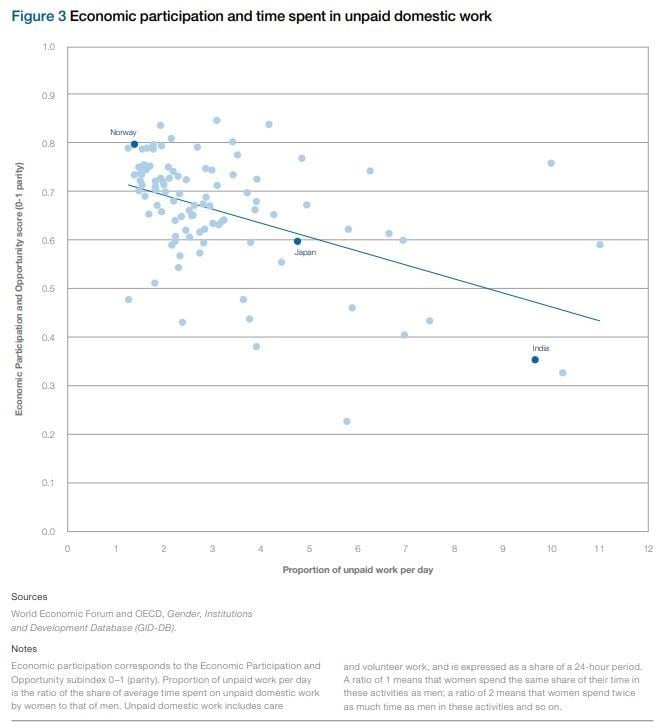How to narrow Japan’s widening gender gap

Japan ranks among the worst 10 performers in political empowerment for women. Image: REUTERS/Kim Kyung-Hoon

Get involved with our crowdsourced digital platform to deliver impact at scale
Stay up to date:
Gender Inequality
Despite efforts in recent years to encourage more parity between men and women, the gender gap in Japan is widening. As the world recognizes International Women’s Day 2020, it’s an important moment to take stock of what’s holding the country back and how it can move forward to gender equality in the decade ahead.
According to the World Economic Forum’s Global Gender Gap Report 2020, Japan ranks 121st out of 153 countries in terms of gender parity, a decline of 11 places compared to its ranking a year before, when it ranked 110th, and a decline of 41 places compared to the 2006 report, the first year of the index when it ranked 80th. Based on the current ranking, Japan’s gender gap is the largest among advanced economies.

The Japanese government has attempted to increase gender parity in recent years. In 2013, Prime Minister Shinzo Abe pledged to create “a Japan in which women can shine,” outlining a “womenomics strategy” where 30% of leadership positions in society would be filled by women in 2020.
Yet progress has not kept pace with promise. In 2015, the government revised its goals to 7% women as national public servants and 15% for local government officials and private companies.
What’s behind Japan’s persistent gender gap?
Political representation is a key area for improvement: Japan currently ranks among the worst 10 performers in the index in terms of political empowerment. Japan has never had a female head of state, and female representation in parliament is one of the lowest in the world, at just 10%, it is 20% below the average share across advanced economies. In addition, there is currently only one woman in the 18-member cabinet, a decline from recent years.
The country has also struggled to significantly narrow its economic gender gap. Only 15% of senior and leadership positions are held by women, and income for women in Japan is about half that of men on average.
One reason for this economic disparity is that women in Japan spend more than four times as much time as men on unpaid domestic work, which means less time to engage in paid labour or work longer hours, which could hold women back from career opportunities and advancements.

In addition, Japan’s gender wage gap is the second largest among Organisation for Economic Co-operation and Development (OECD) nations, with the Republic of Korea having the largest gap.
As Japan Times has reported, another reason for unequal economic progress is that culturally there are often negative perceptions about women in top leadership roles. According to a 2018 study by Kantar and Women Political Leaders, only 24% of people in Japan said they would feel comfortable having a woman as a CEO of a major company, compared to 63% in the US.
Too often, unconscious biases and societal expectations of traditional gender roles can hold women back or create workplace hurdles such as harassment.
So how can Japan overcome these barriers and support gender parity?
Increasing political representation is key. More women in positions of political decision-making can create a role model effect that could encourage more women to enter politics and leadership roles. Countries with higher levels of women in political power have also been found to have higher levels of women in business leadership.
Policies and incentives for increasing parity across the economy can also help. These can include quotas, targets for wage equity and updated family policies that support men and women – and ensure that uptake is more equally distributed across fathers and mothers.
Businesses must also take the lead to create inclusive workplaces with diverse hiring and promotion practices, as well as flexible, family-friendly policies. They must commit to wage equality and pursuing practices that enable women to access career opportunities and advancements.
These are long-standing wisdoms but implementation has been missing or ineffective. What might a more accelerated strategy look like? Leaders should focus on steps to equip women with in-demand skills. By 2022, 42% of core skills required to perform existing jobs are expected to change, as the Fourth Industrial Revolution transforms economies and the workplace. Both political and corporate leaders should focus on reskilling, upskilling and educational opportunities to empower more women to fill the fastest-growing roles in the new economy, including those in data, artificial intelligence, engineering and cloud computing.
Encouraging more women to rise in business can pay off. Studies have shown that companies with more diversity have better long-term performance. Economic gender parity could add $550 billion to Japan’s GDP, according to estimates.
Now is the time for Japan to adopt forward-thinking inclusive policies and practices that empower and enable women to thrive in the new economy. Only then can the country narrow its gender gap and realize the benefits of gender equality.
Don't miss any update on this topic
Create a free account and access your personalized content collection with our latest publications and analyses.
License and Republishing
World Economic Forum articles may be republished in accordance with the Creative Commons Attribution-NonCommercial-NoDerivatives 4.0 International Public License, and in accordance with our Terms of Use.
The views expressed in this article are those of the author alone and not the World Economic Forum.
The Agenda Weekly
A weekly update of the most important issues driving the global agenda
You can unsubscribe at any time using the link in our emails. For more details, review our privacy policy.
More on Gender InequalitySee all
Morgan Camp
April 9, 2024
Rida Tahir
April 9, 2024
Andrea Willige
April 8, 2024
Gilles Roucolle and Sumati Sharma
April 5, 2024
Victoria Masterson
April 5, 2024






